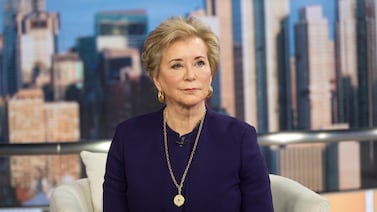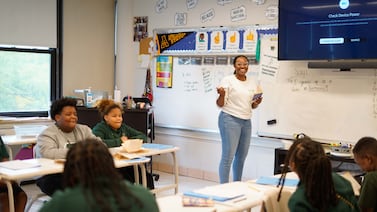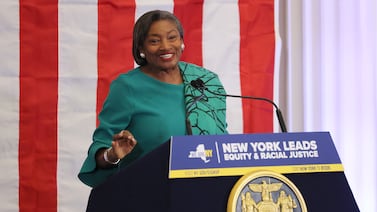Virtual public comment at Denver school board meetings may be here to stay, even as board members consider resuming in-person meetings and students head back to school buildings.
In a discussion Thursday, board members cited numerous advantages of allowing the public to weigh in on district business via Zoom and expressed support for continuing the practice. In addition to being safer during the COVID-19 pandemic, virtual public comment has allowed students, parents, and teachers who otherwise wouldn’t be able to attend a board meeting in a gymnasium on a weeknight to participate, board members said.
“We have heard from our communities in saying, ‘Thank you for letting us participate virtually,’” board Vice President Jennifer Bacon said. Families don’t have to find childcare, navigate traffic, or pay for parking to be able to share their thoughts with the board, she said. Board member Angela Cobián agreed, calling virtual public comment a “game changer” for some families.
Board members also considered, but ultimately did not support, placing limits on what members of the public could talk about or how long public comment could last.
The discussion comes after a group called No Left Turn in Education began speaking during public comment. No Left Turn members — some but not all of whom identified as Denver parents — have criticized how Denver schools celebrated Black History Month and spoken out against critical race theory, which Denver Public Schools has said it does not teach.
Before the pandemic, anyone wanting to address the Denver board had to show up in person even though the meetings were livestreamed. In spring 2020, the board’s meetings moved online,and so did public comment. The rules stayed the same: Anyone can speak about any subject. Each speaker is given three minutes, while groups are given up to 10 minutes.
Denver Public Schools’ policy differs from those in surrounding school districts. Some districts only allow speakers to talk about the items on the board’s agenda. Other districts limit the total amount of time allotted to public comment to one hour per meeting.
Denver’s public comment, on the other hand, has on occasion stretched for four hours or more, especially if the board is voting on a controversial issue.
But Denver board members said they don’t want to limit the amount of time allotted for public comment. Most said they don’t want to restrict what people can talk about, either, though there was some discussion about whether speakers should be allowed to “attack” board members.
Several members said they’d be interested in letting students and people who live in Denver speak first. When board meetings, which begin at 4:30 p.m., stretch into the night, the number of people who stick around to give their public comment dwindles.
Board member Tay Anderson floated the idea of moving public comment from the monthly meetings, held every third Thursday, at which the board votes on new policies to a separate meeting earlier the same week. That would allow board members to follow up with speakers before casting a vote, which isn’t something they can do under the current setup.
The board didn’t make any decisions. Its next monthly meeting is Aug. 26.







